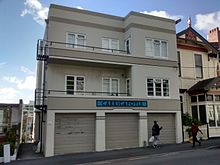Carrigafoyle, Wellington
| Carrigafoyle | |
|---|---|
 | |
 | |
| General information | |
| Architectural style | Edwardian |
| Location | 195 The Terrace, Wellington, New Zealand |
| Coordinates | 41°17′13″S 174°46′23″E / 41.286897°S 174.773187°E |
| Completed | 1903 |
| Design and construction | |
| Architect(s) | Penty & Blake[1] |
| Main contractor | W Fyfe[1] |
| Designated | 11 July 1986 |
| Reference no. | 1345 |
Carrigafoyle (meaning "on a rock overlooking water") is a historic building in Wellington, New Zealand.

The house was designed by Penty & Blake for Robert and Elizabeth O'Connor. Robert's Irish ancestors were said to extend back to Carrigafoyle, County Kerry in Ireland.[2] Elizabeth was a daughter of the Hon John Martin, after whom Martinborough is named.[3] The house as designed had two main floors plus a basement and sub-basement facing the harbour.[4] There were seven bedrooms and various living spaces. There was a 'principal staircase' for family and guests and a smaller staircase on the opposite side of the building for servants' use. The basement held the billiard room and a museum, which was a private project of the O'Connors' son Albert Creagh O'Connor.[4] 'Spectacular' art nouveau stained glass windows were designed by Charles Edward Carter of Robert Martin Ltd.[5][6]
After Elizabeth O'Connor died in 1919 the house was put up for sale. A real estate advertisement at that time said the house had 11 bedrooms, a dining room, morning room, drawing room, lounge hall, full-size billiard room, conservatory, telephone room, dark room and two balconies with "glorious" views of the harbour.[7] It was brought by the Stevenson-Wright Family at this point who operated it as a boarding house until the 1970’s when it was sold. The building was restored in the 1980s by Rex Nicholls (a former city councillor). It is flanked by an art deco building bearing the same name.[1]
The building is classified as a Category 1 Historic Place (places of "special or outstanding historical or cultural heritage significance or value") by Heritage New Zealand.[3]
It is mentioned in the song 'Adelphi Apartments' by Tiny Ruins, New Zealand singer-songwriter Hollie Fullbrook.

References
[edit]- ^ a b c Kernohan, D. (1994). "Wellington's Old Buildings", Wellington: Victoria University Press
- ^ "Personal Items". Wairarapa Daily Times. 13 August 1929. Retrieved 2 March 2021 – via Paperspast.
- ^ a b "Carrigafoyle". New Zealand Heritage List/Rārangi Kōrero. Heritage New Zealand. Retrieved 21 December 2009.
- ^ a b "Penty & Blake, architects :Proposed residence Wellington Terrace for Mr R O'Connor. Sep 1, 1903". ndhadeliver.natlib.govt.nz. Retrieved 2 March 2021.
- ^ "Edwardian decorative stained glass from houses in Christchurch and Wellington". Alexander Turnbull Library. 1901–1910. Archived from the original on 4 February 2016. Retrieved 2 March 2021.
- ^ Brown, Ray (2013). "The Robert Martin Ltd Decorating and Stained Glass business, Wellington, New Zealand" (PDF). Ferguson and Urie: Colonial Victoria's Historic Stained Glass Craftsmen 1853–1899. Retrieved 3 March 2021.
- ^ "Sale of Gentleman's 18-Room Residence". Evening Post. 24 September 1919. Retrieved 2 March 2021 – via Paperspast.
External links
[edit]![]() Media related to Carrigafoyle, Wellington at Wikimedia Commons
Media related to Carrigafoyle, Wellington at Wikimedia Commons
